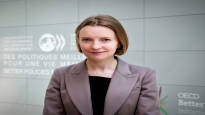Clare Lombardelli, the newly appointed chief economist of the economic organization OECD, welcomes the adaptation plans presented in the government negotiations.
Elli-Alina Hiilamo,
Miina Väisänen
Government negotiations are already taking place in the Säätytalo in Helsinki for the sixth week. Forming the board Petteri Orpon (collective) there are still difficult issues to be resolved. One big issue is the balancing of the public finances and the adjustment measures of six billion euros.
If Orpo’s goals go through, Finland may soon face significant austerity measures.
The recent chief economist of the economic organization OECD by Clare Lombardelli doesn’t sound like a bad idea at all.
– We have only just seen the ambitious adaptation goal, but of course we don’t know the details of the savings yet, he says in an interview with .
– A moderate adjustment of public finances will help Finland fight inflation and stabilize the debt ratio and make it turn downward. Depending on the details of the adjustment measures, a moderate adjustment would be good for the Finnish economy.
The British Lombardelli has been working as the chief economist of the OECD since the beginning of May. Previously, he has worked, for example, at the British Ministry of Finance.
How can the Finnish economy be fixed?
The OECD published its latest economic forecast today. The organization estimates that the Finnish economy will not grow at all this year, and next year it estimates that the gross domestic product will grow by 1.2 percent.
Economic growth in Finland is slower than in the OECD countries combined, as the GDP of the OECD countries is estimated to grow by 1.4 percent this year and next.
One of the main election themes of the government leader Petteri Orpo and the coalition was to get “Finland’s economy in order”.
But how does it work? What should the focus be on, according to the OECD’s chief economist?
Lombardelli raises three issues.
First of all, Finland must succeed in responding to the labor shortage. He gives two instructions for this.
– The key is to focus on immigration and improving women’s participation.
– Immigration can ease the labor shortage, but of course countries must also invest in the knowledge of their population.
According to Lombardelli, improving the labor market position of women is important for economic growth.
– In various parts of Europe and worldwide, we see that women have lower employment than men and often women are also paid less than men. Countries should pay attention to these issues and improve the situation. It would increase economic growth and productivity.
From the data collected by the OECD, it appears that in Finland the role of women in the labor market is weaker than in the reference countries Sweden, Norway and Denmark, when looking at the participation rate of women. However, it is good to note that in the other Nordic countries the combined participation rate of women and men is also higher than in Finland.
At the end of last year, the Finnish labor force participation rate for men was 64.0 percent, while it was 58.7 percent for women. The participation rate takes into account the employed and those actively looking for work.
The global economic growth forecast was revised upwards
Thirdly, according to Lombardelli, Finland should invest in research and product development.
In this matter too, Finland seems to be lagging behind many countries, even though the money directed to research and product development is higher than the average of OECD countries. According to the OECD, Finland spent 3.0 percent of its gross domestic product on research and product development, while the corresponding figure in Sweden, for example, was 3.3 percent.
In its latest review published today, the OECD estimates that the world economy is turning in a more positive direction, although there are still many risks.
It corrected its global economic growth forecast slightly upwards from the forecast published at the beginning of the year. The global economy is estimated to grow by 2.7 percent this year and 2.9 percent next year.
Politiikkaradio discussed the income limit for immigrants in the government negotiations on Tuesday. Listen to the episode below.
The subject can be discussed until Thursday, June 8, at 11 p.m.
